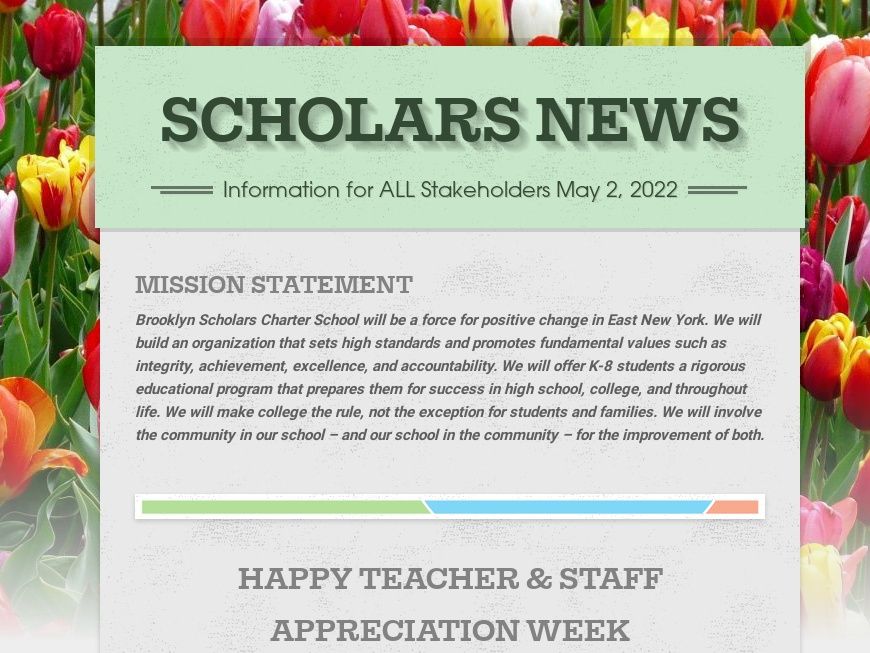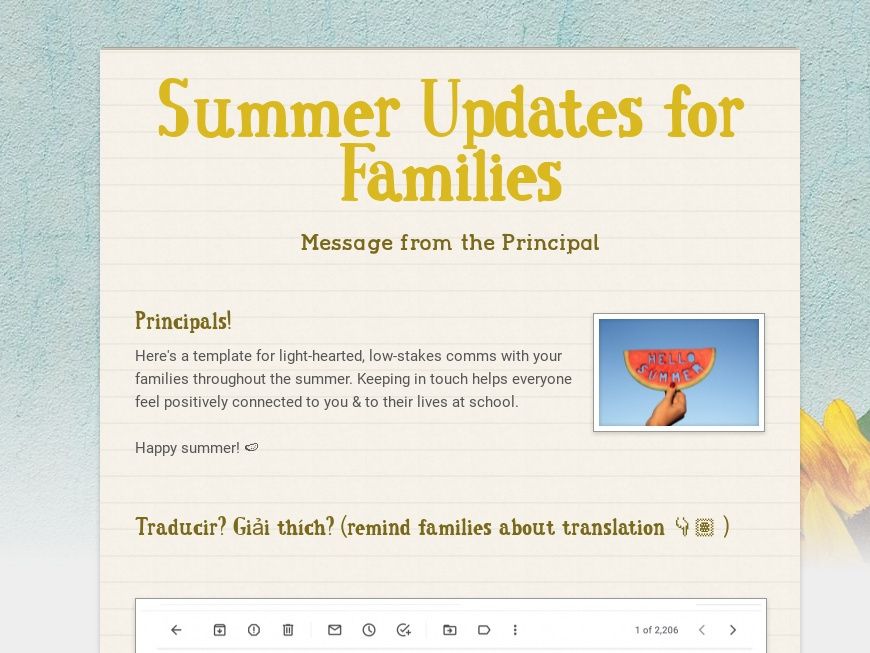☕️ Busy? Here's the TL;DR
- We asked 2 principals for their communications advice
- Tip #1: Consistency is key. Train your readers to expect updates.
- Tip #2: Know what your community wants & deliver that content.
- Tip #3: Actively review analytics to understand what needs improvement.
Many elements go into planning a new school year; one of the most important is communication.
We asked two public school principals, and expert Smore users, how they succeeded at family and faculty school communication: Roxanne Thomas, Principal at Brooklyn Scholars Charter School, uses a school newsletter to communicate on a weekly basis to hundreds of parents, staff, and board members. Ross Hogan, Principal at Duzine Elementary School in New Paltz, NY, sends a weekly school newsletter to hundreds of families and staff.
They identified 3 common principles of successful school communication: consistency, intentionality, and using feedback to improve.
Tip 1: Consistent Communication
Consistency has been a recurring message in regards to successful school communication.
Principal Roxanne Thomas originally felt overwhelmed by the pressure to create regular newsletters. But once she got started with Smore and realized it was actually “...very simple to navigate...” she began sending them out every Sunday to staff, parents, and board members.
As she monitored her analytics, she realized consistency was helping to build her readership.

For Principal Hogan, consistency has also been an essential element to his success.
He understood that parents aren't always able to enter the school or to see what’s happening in their children's classrooms, especially now because of Covid. So, he encouraged teachers to write weekly newsletters to help families feel more informed and connected, which research shows is critical to parent engagement.
He said, “I see it as an important way to let families know these are the great things that we're doing and these are the ways that you know your children are creating.”
Tip 2: Intentional Communication
Principal Thomas decided to focus on showcasing program, adding pictures and messages highlighting students at work. By making her school newsletters more intentional, her readers were receiving relevant and insightful information they were able to engage with, “When I walk throughout the building or when I talk to teachers and other staff members, there's an intentional focus on what we are doing, what the parents need to know. That whole area now focuses my attention and makes my newsletters better.
Developing a focus was also a time-saver: "I now have more time to walk the building and not be stuck in my office, and do more observations, and talk to the kids.“
Principal Hogan also made intentional decisions with his newsletters to fit with his audience.
Not only was it important for him to present a product to families and faculty that was fresh, colorful, and engaging, he wanted to make sure to include every parent and caregiver. This meant a translation feature was a must-have. By figuring out the right communication structure for his school, Principal Hogan was able to shift his attention and “...focus more on the day-to-day runnings of the school, focus more on the great things that go into the newsletter, which is, you know, developing school-wide programs and school-wide initiatives.”
Like Principal Thomas, as his communication became more intentional, he was able to redirect his time and attention to developing program.

Tip 3. Implementing Feedback
“Now, in this day and age where people are clicking and pushing buttons, [Smore] definitely allows for that. It's interactive and that's what people want; they don't want to just sit and get, they want to be involved by getting up and moving and Smore allows you to move, by clicking a button.” - Roxanne Thomas, Principal of Brooklyn Scholars Charter School
Principal Thomas discovered the importance of data and analytics when she started making decisions that directly impacted reader engagement.
Families were not only receiving information in an organized fashion, they were also reading and engaging with it. She learned, through reader feedback, that what mattered the most to her community was content highlighting student and faculty achievements. Seeing her readership rise in response to certain content and images influenced the content strategy of her school newsletters.
Principal Hogan found it was the engaging, dynamic, and visual aspects of his school newsletters capturing the attention of his readers.
He got feedback from parents about how much they enjoyed seeing their children's pictures and artwork, and the different initiatives taking place at school. Finding the balance between content that engages parents, while also keeping families and faculty in the loop with important information, is Principal Hogan’s goal for his school’s communication strategy, “...the world is changing and schools are changing and you really need to be nimble in terms of your communication and to make sure that you're being reflective of what the needs are.”
Approaching communications with consistency, intentionality, and appreciation for feedback will go a long way to ensuring a strong relationship with parents, faculty, and staff.
We can sum it up with this thought from Principal Ross Hogan:
“I think it's really important that I view the family-school connection as a partnership. It has to be a partnership. Families are giving us a lot of responsibility by allowing us to be in charge of their child's education for six and a half hours a day, and so, as part of that partnership, there needs to be an open line of communication at all times. The philosophy that I have when I approach parent communication is that it's really critical that families understand that they have a say and that we're listening to them.“
Get started with your own update now! Just click to duplicate & personalize this starter template.






